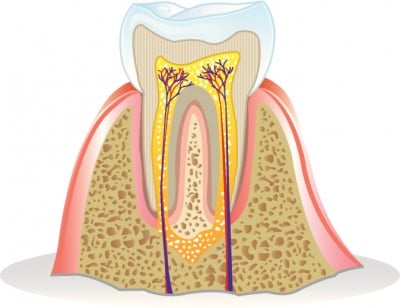What Does Root Canal Therapy Treat?
 Bacteria live in our mouths. They live on the surface of our teeth, our gums, tongue, and everything else. But when bacteria get inside our teeth, they can cause serious problem. When you suffer decay, or have a cracked tooth that allows bacteria to infect the interior of your tooth, the result can be dangerous. The abscessed or infected tooth becomes a breeding ground for more bacteria. The infection can spread to your jaw, your blood, and even your brain, which can be life-threatening.
Bacteria live in our mouths. They live on the surface of our teeth, our gums, tongue, and everything else. But when bacteria get inside our teeth, they can cause serious problem. When you suffer decay, or have a cracked tooth that allows bacteria to infect the interior of your tooth, the result can be dangerous. The abscessed or infected tooth becomes a breeding ground for more bacteria. The infection can spread to your jaw, your blood, and even your brain, which can be life-threatening.
How Do I Know I Might Need a Root Canal?
There are many symptoms to look for that might indicate an infected tooth:
- Persistent or recurring toothache
- Temperature sensitivity that leads to lasting pain
- A localized warm spot on your gums
- Pus-filled blisters on your gums
- Gum sensitivity
Some people may need a root canal, but only have slight pain (so far) and don’t notice any of the other symptoms (yet). Dr. Lee can diagnose your infected tooth in an exam. He will show you what he sees using the intraoral camera and explain the diagnosis.
How Root Canal Therapy Works
In root canal therapy, your dentist will remove bacteria and the infected nerve from the interior of your tooth and fills the tooth with inert material that supports it. Then the tooth is protected with a durable, cosmetic dental crown that covers its entire surface.
Is Root Canal Therapy Painful?
There is some discomfort associated with a root canal, but it is minor compared to the pain of an infected tooth. It also passes relatively quickly, and can be controlled with the use of over-the-counter or prescription medication.
Are There Other Options?
Root canal therapy is actually a great treatment. It is about 95% successful in saving your tooth, which may last the rest of your life when protected by a crown and properly cared for. However, if you desire, you may ask to have the tooth extracted and replaced with a dental implant in many cases.
To talk to a dentist about your symptoms and possible treatment, if you live in the Sydney area, please call (02) 9686 7375 or contact us to schedule an appointment at our office in Baulkham Hills, NSW.
Any surgical or invasive procedure carries risks. Before proceeding, you should seek a second opinion from an appropriately qualified health practitioner.

